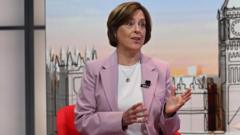Is BBC Ignoring Urgent Need for Change Amid Controversies?

Understanding the Call for Accountability at the BBC Following Recent Controversies
In a world where media plays a pivotal role in shaping public opinion, the responsibility of broadcasting corporations like the BBC cannot be overstated. Recently, the head of Ofcom, Dame Melanie Dawes, voiced urgent concerns about the BBC's handling of controversies, specifically citing the punk-rap duo Bob Vylan's performance at Glastonbury and a documentary about Gaza. The need for quicker conclusions to reports and investigations has never been more pressing. This article aims to unpack these events, analyze the implications for the BBC, and discuss the broader significance of accountability in media.
Recent Controversies: A Closer Look
The Glastonbury Incident
Bob Vylan's performance at the iconic Glastonbury Festival became a flashpoint for debate when the duo led the crowd in chants that included "death, death to the IDF [Israel Defense Forces]." This prompted widespread condemnation, with many accusing the BBC of granting a platform for incitement of violence. The backlash from the Jewish community and other organizations highlights the sensitive nature of political commentary in entertainment.
The Gaza Documentary Withdrawal
In February, the BBC faced criticism for its documentary "Gaza: How to Survive a Warzone." The program was pulled after revealing a connection between its young narrator and Hamas, raising questions about the editorial integrity of the BBC. This incident further fueled calls for the organization to conduct more rigorous vetting processes for its content.
Implications of Delayed Responses
Dame Melanie Dawes stressed that the BBC's delayed responses to controversies could erode public trust. She highlighted the frustration felt by many when the corporation took longer to react to public outcry compared to the speed at which the issues became public knowledge. This disconnect poses a real risk of diminishing confidence in the BBC's ability to deliver unbiased and responsible journalism.
The Need for Speed in Investigations
In her statements, Dame Melanie emphasized the importance of completing investigations swiftly. She asserted that when things go awry, the BBC's leadership must recognize the issues and take decisive action. A quick and thorough investigation is crucial not only for accountability but also for restoring public trust.
What the BBC Is Doing
In response to the criticisms, the BBC has committed to conducting investigations into both the Glastonbury incident and the Gaza documentary. A spokesperson indicated that findings from the Gaza documentary review would be published as soon as possible. However, they also stressed the importance of a thorough process, which may take time.
Changes in Broadcasting Policy
Following these controversies, the BBC announced that it would no longer broadcast live performances deemed "high risk." This decision indicates a significant shift in policy aimed at preventing further incidents that could lead to public outrage. The organization is also expected to answer questions from the Culture Secretary regarding the Bob Vylan performance, demonstrating a commitment to transparency.
The Broader Context: Media Accountability
The controversies surrounding the BBC are not isolated incidents; they reflect a broader trend in media accountability. As the landscape of journalism evolves, the expectations for media organizations have also changed. Audiences are demanding transparency, ethical reporting, and swift action when missteps occur.
The Role of Regulatory Bodies
Organizations like Ofcom play a vital role in overseeing media conduct and ensuring that broadcasters adhere to ethical standards. Dame Melanie's comments highlight the necessity for regulatory bodies to hold media organizations accountable for their actions. This is particularly important when it comes to sensitive topics that can incite public unrest.
Public Reaction and the Future of the BBC
The public's reaction to the BBC's handling of these controversies has been mixed. While some support the need for accountability and transparency, others feel that the organization has failed in its duty to provide responsible journalism. As the BBC moves forward, it must navigate these challenges carefully to maintain its reputation as a trusted news source.
Calls for Legal Action
Some political figures, including Shadow Home Secretary Chris Philp, have gone as far as suggesting that the BBC should face legal scrutiny for broadcasting content they deem inciting violence. This raises questions about the legal boundaries of free speech and the responsibility of broadcasters to ensure that their content does not cross into dangerous territory.
Conclusion: A Pivotal Moment for the BBC
The recent controversies surrounding the BBC represent a pivotal moment in the organization’s history. As Dame Melanie Dawes and other leaders urge for quicker responses and more accountability, the BBC must take these criticisms seriously. By fostering a culture of transparency and swift action, the organization can work towards regaining public trust and ensuring that it continues to serve as a reliable source of information.
As these events unfold, it’s essential for the BBC and other media outlets to reflect on their role in a rapidly changing world. The balance between editorial freedom and social responsibility is delicate but crucial. The path forward will require commitment, introspection, and an unwavering dedication to ethical journalism.
Frequently Asked Questions
What are the main controversies involving the BBC recently?
The BBC has faced criticism for two significant incidents: Bob Vylan's performance at Glastonbury, where derogatory comments were made, and the withdrawal of a documentary about Gaza due to a link with Hamas.
What actions is the BBC taking in response to these controversies?
The BBC has committed to conducting thorough investigations into both incidents and will no longer broadcast live performances deemed "high risk." They are also expected to provide answers to regulatory questions regarding these events.
How does public trust in the BBC impact its operations?
Public trust is essential for the BBC to function effectively as a public service broadcaster. Losing this trust can lead to diminished viewership and challenges in fulfilling its mission to inform the public responsibly.
What role does Ofcom play in regulating the BBC?
Ofcom is the regulatory body responsible for overseeing media conduct in the UK, ensuring that broadcasters adhere to ethical standards and holding them accountable for their actions.
As the BBC navigates these challenges, how can it ensure that it remains a trusted source of information in a rapidly evolving media landscape? #BBC #MediaAccountability #PublicTrust
Published: 2025-07-13 13:07:05 | Category: technology



